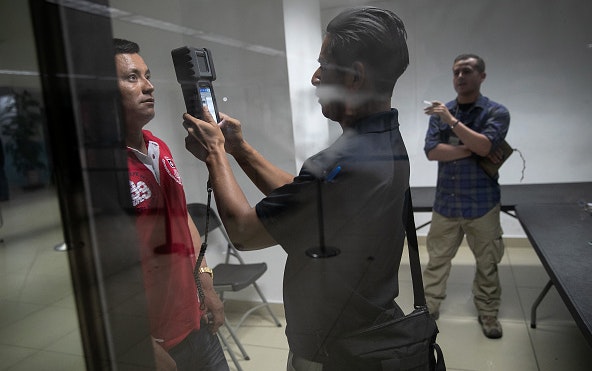Mhlungwana v. the State and the Minister of Police
Peaceful Protest Should Not be a Crime
Fifteen activists from the Social Justice Coalition held a small protest in Cape Town to demand better sanitation services. More people joined the demonstration. But South African law makes it a criminal offence for more than 15 people to gather without prior notice to the authorities, and they were arrested by the police. The protesters argued that it is unconstitutional to make the failure to give prior notice of an assembly a crime. The Justice Initiative intervened to argue that the law is out of step with international standards on freedom of peaceful assembly and goes beyond what is reasonable and justifiable in an open and democratic society.
Facts
The Social Justice Coalition (SJC) held a demonstration outside the Cape Town Civic Centre on September 11, 2013 to demand better sanitation services. The intention was to limit the number of participants to 15 persons, so as to avoid the need to give prior notice to the authorities. During the protest, emotions ran high and a number of persons who had been called up to assist the demonstrators in various ways, such as supplying food and water, began to join in. A police count revealed the presence of more than 15 participants. 21 persons were detained and charged with an offence under section 12(1)(a) of the RGA.
Section 12(1)(a) of South Africa’s Regulation of Gatherings Act (RGA) makes it an offence, punishable by a fine and up to one year’s imprisonment, for the conveners of a gathering to fail to give prior notice to the local authority. A gathering is defined as an assembly, concourse or procession of more than 15 persons in a public place.
The Magistrate’s Court accepted that the gathering had been “respectful and peaceful”, that there had been “no harm to anyone”, and that the demonstrators had not prevented access to the Civic Centre. It considered the defendants’ actions understandable, but not excusable. The 10 persons identified as the conveners of the gathering were found guilty, cautioned and discharged.
These 10 persons then appealed and argued that section 12(1)(a) of the RGA is an unconstitutional limitation on the right to assemble protected by section 17 of the Constitution, to the extent that it criminalizes the convening of a gathering solely on the basis that more than 15 persons attended and no prior notice was given.
Open Society Justice Initiative Involvement
The Justice Initiative prepared an amicus curiae brief that provides an overview of international law and standards relevant to the case, as well as legal precedents established at the domestic level in other democracies.
Arguments
The Justice Initiative argued that Section 12(1)(a) of the RGA is out of step with international standards because (1) it renders failure to give notice an automatic offence, irrespective of any demonstrable harm, and (2) it threatens conveners of gatherings with criminal sanctions, which moreover are severe (up to a year’s imprisonment).
Relevance of International Law. The submissions presented are relevant because Section 39 of the South African Constitution says that courts interpreting the Bill of Rights must consider international law, and may consider foreign law.
Freedom of Assembly. Section 12(1)(a) of the RGA constitutes a limitation on the right to assemble, as it may inhibit groups and individuals from convening gatherings with more than 15 participants – as illustrated by the Appellants’ original intentions. The United Nations Human Rights Committee (HRC) and the European Court of Human Rights (ECtHR) have also deemed that criminalization of failure to give notice constitutes a limitation on freedom of peaceful assembly.
Criminal Sanctions are Excessive. The HRC and regional human rights mechanisms have recognized the legitimacy of imposing a requirement of prior notice for assemblies. However, they have required a separate, individualized justification for any enforcement measures. The UN Special Rapporteur on the rights to freedom of peaceful assembly and of association, Maina Kiai, has stated that failure to provide prior notice should not lead to the organizers of an assembly being “subject to criminal sanctions, or administrative sanctions resulting in fines or imprisonment.” The Study Group on Freedom of Association and Assembly in Africa considers that sanctions may be imposed “only when lack of notification is combined with demonstrable harms”, whilst the ECtHR has held that peaceful protests should not in principle be subject to the risk of criminal sanctions and that a notice requirement may not be enforced absent a “compelling consideration”, other than simply upholding the law. The Inter-American Commission on Human Rights also discourages the use of criminal law.
Comparative Standards. Many countries, including established democracies, criminalize failure to give notice of an assembly, but the law of a number of countries demonstrates the viability of alternative approaches that are less restrictive of freedom of assembly. In most Australian jurisdictions, prior notice is not expected or is an optional procedure, through which organizers of assemblies can secure immunity from certain forms of criminal and civil liability. In Brazil, public authorities have used civil law to enforce the notice requirement prescribed by the Constitution. In the UK, no prior notice is required of static (non-moving) assemblies. In Malaysia, a panel of the Court of Appeal considered it unconstitutional to hold an organizer criminally liable for failure to give notice, although the legal position is now in limbo due to another panel’s ruling to the opposite effect.
Constitutional Court upholds High Court judgment, saying that the criminalisation of not giving notice for a protest deters the exercise of the right to assemble and “deterrence by its very nature limits the exercise of this right”. The Court also set aside the conviction of the ten.
Constitutional Court hearing.
Western Cape High Court rules that section 12(1)(a) of the RGA was invalid and unconstitutional. Government launches appeal to Constitutional Court.
The amicus curiae brief prepared by the Justice Initiative is submitted.
The ten persons notify the High Court of the grounds on which they intend to challenge the constitutionality of section 12(1)(a) of the RGA.
The Magistrate’s Court finds ten persons identified as the conveners of the gathering guilty of an offence under section 12(1)(a) of the RGA.
The Social Justice Coalition demonstrates outside the Cape Town Civic Centre. 21 persons are arrested.
Related Work
African Court Calls on Nations to Bolster Election Fairness and Transparency During COVID-19
All African Union Member States have a duty under international law to guarantee fairness and transparency in elections during the COVID-19 pandemic.
The U.S. Department of Homeland Security is Deploying a Massive New Database to Gather Biometric Information
A new U.S. Department of Homeland Security biometric database is projected to contain information on hundreds of millions of people by 2022 and represents an alarming development to scale up the agency's surveillance and information-sharing ability.

How NGOs, Journalists, and Courtroom Eyewitnesses can Strengthen Reporting on Atrocity Crimes Trials
Trial monitors play an important role in keeping the public informed of events in the courtroom. The Justice Initiative’s Monitoring Atrocity Crimes Trials: A Guide, offers clear guidance on what to monitor and how to convey important information.
